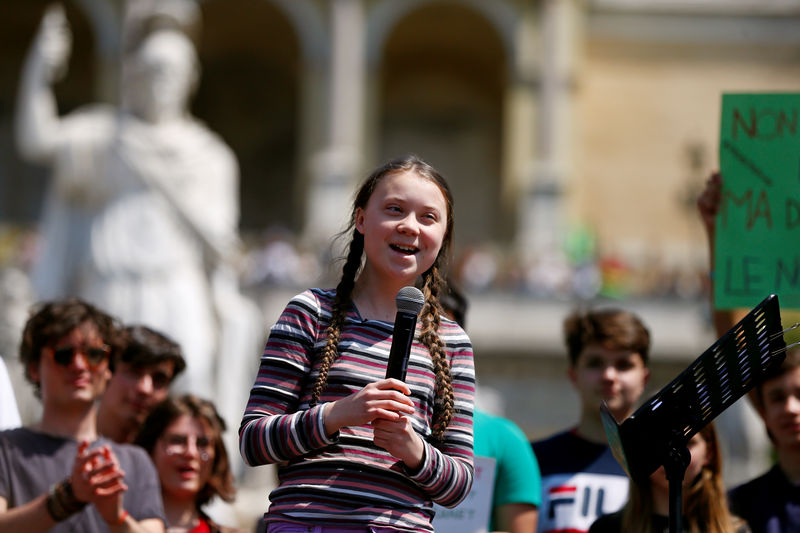By Matthew Green
LONDON (Reuters) - Children, some as young as eight, will walk out of class in cities around the world on Friday in a fresh wave of strikes called by young people who fear adults are sleepwalking toward a collapse in the global climate system.
With coordinators expecting more than a million youths to join protests in at least 110 countries, students inspired by 16-year-old Swedish activist Greta Thunberg are demanding politicians and business leaders act quickly to curb greenhouse gas emissions.
"We seem to have this amazing capability of forgetting horrible things and going on with our daily lives, but adults need to start acting," said Helena Marschall, 16, who is coordinating a strike in the German financial capital Frankfurt.
"If we don’t act now we will soon reach crucial tipping points of our climate system, meaning after that there’s no way out anymore," Marschall said, taking a break from lobbying Deutsche Bank (DE:DBKGn) executives to divest from polluting industries at the company's annual general meeting on Thursday.
Since Thunberg began a single-handed climate protest outside the Swedish parliament in August, the Fridays for Future school strike movement has grown exponentially, with groups of friends inspired by her example rapidly clustering into larger, self-organizing networks connected across time zones by social media.
After Marschall began striking on Friday afternoons with a small group of friends in December, support kept doubling until 8,000 young people protested in Frankfurt at an initial global strike on March 15. An estimated 1.5 million young people took part worldwide.
Against a backdrop of elections to the European Parliament, which began earlier on Thursday, the Frankfurt school strikers plan to march on the headquarters of the European Central Bank on Friday to demand it stop financing the fossil fuel industry. The ECB says its mandate is to control inflation and not to favor certain market sectors over others.
Although the strikes have been concentrated most heavily in Western Europe, North America and Australia, demonstrations have taken place in Mexico, South Africa and on a smaller scale in dozens of other countries across the global south.
"My environment is being destroyed by the fossil fuel industry," said Sainey Gibba, 22, a graduate student organizing a school strike in the West African country of Gambia. "I have to do something before it's too late."
EXISTENTIAL RISK
The viral school strike phenomenon has flipped traditional patterns of authority, handing leadership roles to teenagers who feel aghast at the mismatch between calls for transformative action from climate scientists and growing carbon emissions.
"Young people get it: it's extraordinary that the politicians who are supposed to be making decisions on their behalf somehow still don't," said Caroline Lucas, a British member of parliament for the Green party, who has supported the school strikes.
Last year, global carbon emissions hit a new record high, despite a warning from the U.N.-backed Intergovernmental Panel on Climate Change in October that output of the gases will have to be slashed over the next 12 years to stabilize the climate.
The concentration of carbon dioxide in Earth's atmosphere is now at its highest level in human history, and probably for 3 million years, according to a study published last month.

"It is the potential end of human civilization as we know it," Katharine Hayhoe, an atmospheric scientist at Texas Tech University, told an audience of students and academics in London last week, referring to the risk of allowing climate change to spiral out of control. "That is what is at stake."